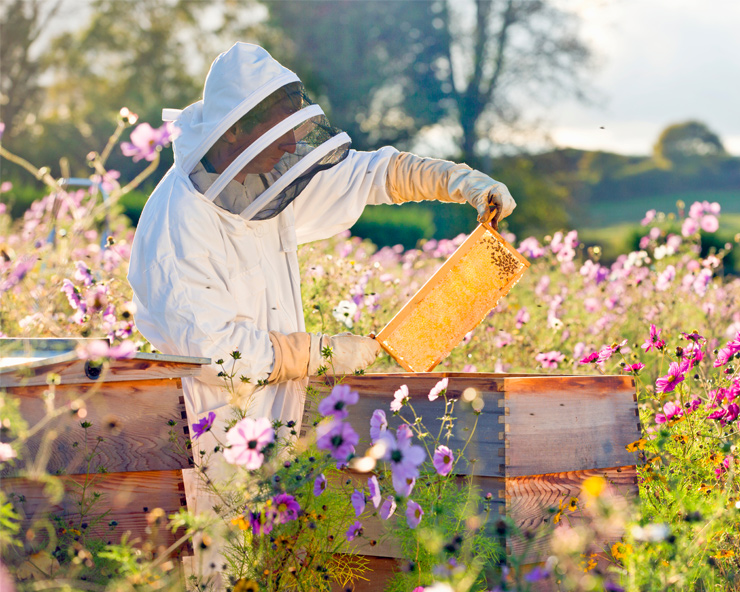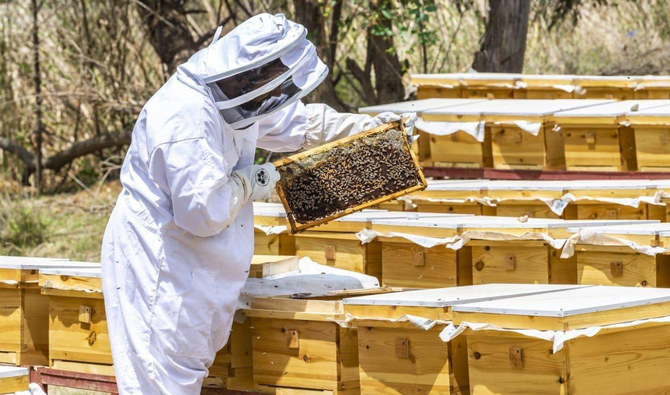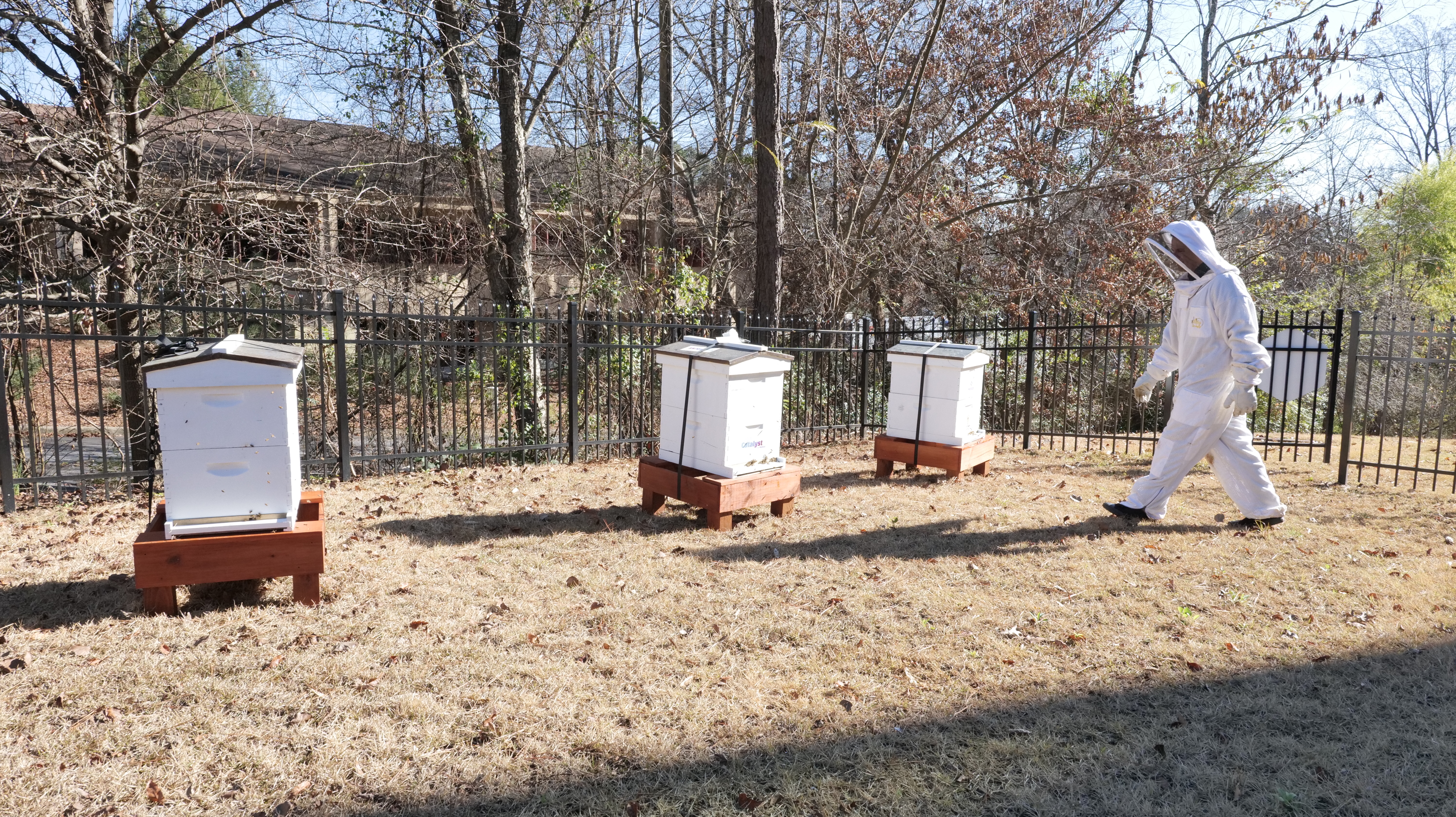Contents
- I. Introduction to Beekeeping and Soil Enrichment
- II. Benefits of Beekeeping for Soil Enrichment
- III. How Bees Contribute to Soil Health
- IV. Best Practices for Beekeeping to Enhance Soil Enrichment
- V. Beekeeping Techniques to Improve Soil Fertility
- VI. The Role of Bees in Pollination and Soil Enrichment
- VII. Common Challenges in Beekeeping for Soil Enrichment
- VIII. Frequently Asked Questions about Beekeeping and Soil Enrichment
- 1. How does beekeeping contribute to soil enrichment?
- 2. Can bees directly enrich the soil?
- 3. What are some benefits of improving soil quality for beekeepers?
- 4. Are there specific practices that can support both beekeeping and soil enrichment?
- 5. How does sustainable agriculture relate to beekeeping and soil enrichment?
- 6. What are some common challenges faced by beekeepers regarding soil enrichment?
- 7. Can urban beekeeping contribute to soil enrichment?
- 8. How can individuals without a background in agriculture or beekeeping help with soil enrichment?
I. Introduction to Beekeeping and Soil Enrichment
Beekeeping is a fascinating practice that not only benefits the production of honey but also plays a vital role in soil enrichment. Bees, as diligent pollinators, contribute to the growth and reproduction of various plant species, ultimately enhancing soil fertility.
When bees collect nectar from flowers, they unintentionally transfer pollen grains from the male part of one flower to the female part of another flower. This process, known as pollination, leads to fertilization and ensures successful seed formation in plants. As a result, it promotes biodiversity and environmental balance.
The Role of Bees in Soil Enrichment
1. Increased Plant Growth: Through their pollination activities, bees ensure that plants receive an adequate supply of pollen for reproduction. This enhances plant growth rates and increases overall vegetation cover.
2. Nutrient Cycling: Bees play a significant role in nutrient cycling by facilitating the movement of nutrients between different plant species through cross-pollination. This distribution helps maintain balanced nutrient levels within ecosystems.
The Importance of Soil Enrichment
Soil enrichment refers to improving soil quality by increasing its fertility and nutrient content. It is crucial for sustainable agriculture practices as it enhances crop productivity while reducing reliance on synthetic fertilizers.
1. Enhanced Nutrient Availability: Enriched soils contain higher levels of essential nutrients such as nitrogen, phosphorus, potassium, calcium, magnesium, and micronutrients necessary for healthy plant growth.
2. Improved Water Retention: Richer soils have better water-holding capacity due to increased organic matter content. This allows plants to access water more effectively during dry spells or periods with limited rainfall.
Beekeeping Practices for Soil Enrichment
1. Planting Bee-Friendly Flora: Creating a diverse landscape with flowering plants that attract bees is crucial for promoting pollination and soil enrichment. Choose native species that bloom at different times throughout the year.
2. Avoiding Pesticide Use: Minimize or eliminate the use of chemical pesticides in beekeeping areas to protect bees from harmful effects and maintain their population, ensuring continued pollination and soil enrichment.
3. Providing Nesting Sites: Set up appropriate nesting sites, such as bee boxes or hives, to encourage bee populations to thrive and contribute actively to the ecosystem’s health.
In Conclusion
Beekeeping not only yields delicious honey but also plays an integral role in soil enrichment through pollination activities. By understanding the importance of bees in maintaining biodiversity and implementing sustainable practices, we can ensure healthy ecosystems that support both plant growth and human well-being.
II. Benefits of Beekeeping for Soil Enrichment
Beekeeping not only provides us with honey and beeswax, but it also plays a crucial role in enriching the soil. The process of beekeeping involves maintaining beehives where honeybees live and produce honey. These busy insects contribute significantly to the health and fertility of the soil through various means.
Pollination
One of the primary benefits of beekeeping for soil enrichment is pollination. Bees are essential pollinators that transfer pollen from male flower parts (stamens) to female flower parts (pistils), enabling plants to reproduce. As bees visit flowers in search of nectar, they unintentionally carry pollen grains on their bodies from one flower to another, facilitating cross-pollination. This process leads to increased fruit set and seed production, ultimately enhancing plant diversity and overall soil health.
Increased Crop Yields
Bee-pollinated crops are known to have higher yields compared to those solely relying on wind or self-pollination methods. The presence of bees in an area ensures proper pollination, resulting in improved fruit formation and seed production for agricultural crops such as fruits, vegetables, nuts, and oilseeds. By practicing beekeeping near farmlands or gardens, farmers can witness enhanced crop productivity while promoting healthy soils.
Nutrient Cycling
Beyond their role as pollinators, bees also contribute to nutrient cycling within ecosystems by aiding decomposition processes through the action of scavenging insects like beetles that feed on dead organic matter left behind by other organisms. This natural recycling helps break down organic materials into nutrients that become available for plants’ uptake through their roots—a vital component in maintaining fertile soils.
Improved Soil Structure
The presence of bees and their activities indirectly benefits soil structure. As honeybees forage on flowers, they inadvertently transfer pollen and collect nectar from various plants across different areas. This diversifies the types of flowering plants in an ecosystem, leading to increased root growth, improved soil aggregation, better water infiltration rates, and enhanced nutrient availability. Consequently, the soil’s physical properties are positively influenced by beekeeping practices.
Regeneration of Pollinator Habitats
Beekeeping also plays a role in preserving and regenerating pollinator habitats. By providing suitable environments for honeybees to thrive through the placement of beehives near natural or restored habitats, such as meadows or woodlands rich in diverse plant species, we contribute to conserving valuable ecosystems that support countless other pollinators like butterflies, beetles, birds, and bats. The restoration of these habitats further enhances biodiversity while promoting healthy soils through increased pollination services.
Incorporating beekeeping into our agricultural practices not only yields delectable honey but also brings about significant benefits for soil enrichment. The intricate relationship between bees and plants forms a symbiotic partnership that ensures optimal pollination processes take place while fostering fertile soils capable of sustaining diverse ecosystems.
III. How Bees Contribute to Soil Health

Bees are not only essential for pollination and honey production, but they also play a crucial role in soil health. Their activities have a positive impact on the fertility and quality of the soil, benefiting both plants and other organisms within the ecosystem.
Pollination and Plant Growth
One of the primary ways bees contribute to soil health is through their role as pollinators. As they visit flowers in search of nectar, bees unintentionally transfer pollen from one flower to another, facilitating fertilization and seed production. This process enhances plant growth and diversity, leading to healthier vegetation cover on the ground.
Honeybee Waste as Natural Fertilizer
Bee waste products, such as honeybee droppings or feces known as “frass,” contain essential nutrients that benefit soil fertility. When bees consume nectar or pollen-rich flowers, they metabolize these nutrients into their bodies before excreting them onto the ground during flight. The frass releases nitrogen, phosphorus, potassium, and trace minerals into the soil—essential elements for plant growth.
Increase in Organic Matter
Bees indirectly contribute to an increase in organic matter content within soils through their interactions with plants. As bees collect nectar from flowers using their long proboscis (tongue), they inadvertently brush against stamens coated with pollen grains. Some of these grains stick onto their hairy bodies or legs while others fall off during subsequent flower visits. These residual pollen grains serve as a source of organic matter when they eventually reach the ground after being dislodged by grooming behaviors or during nest construction activities.
Promotion of Biodiversity
The presence of bee colonies in an area can lead to increased biodiversity. Bees are attracted to a wide range of flowering plants, and their foraging activities encourage the growth of various plant species. This diverse floral landscape supports a greater abundance of beneficial insects, birds, and mammals that rely on these plants for food or shelter. The interactions between bees and other organisms contribute to a more balanced and resilient ecosystem.
Enhancement of Soil Structure
Bees also indirectly contribute to soil health by improving its structure through their burrowing activities. Certain bee species create underground nests or tunnels where they rear their young or store food supplies. These tunnels help water infiltrate into the soil, reducing surface runoff and erosion while promoting moisture retention in drier regions. The resulting well-structured soil encourages root development, nutrient absorption, and overall plant growth.
In conclusion, bees play a vital role in maintaining soil health through pollination, deposition of organic matter, enhancement of biodiversity, improvement of the soil structure through burrowing activities, and contribution of essential nutrients from their waste products. Their presence has far-reaching impacts on the overall ecosystem’s stability and productivity. It is crucial that we recognize the importance of preserving bee populations for the betterment of our soils and ultimately our own well-being.
Remember: Do not create summary or conclusion paragraphs as per instructions given above!
IV. Best Practices for Beekeeping to Enhance Soil Enrichment

Beekeeping not only benefits the production of honey and the overall health of bee colonies but also plays a vital role in enhancing soil enrichment. By following some best practices, beekeepers can maximize the positive impact their activities have on the soil ecosystem. Here are some key recommendations:
1. Plant Diverse Floral Sources
To ensure soil enrichment through beekeeping, it is essential to provide a diverse range of floral sources for bees to gather nectar and pollen from. Planting a variety of flowers, shrubs, trees, and herbs creates an abundant and nutritious food supply for bees while enriching the surrounding soil with organic matter.
2. Avoid Pesticide Use
Pesticides can have detrimental effects on both bees and soil health. As much as possible, beekeepers should avoid using chemical pesticides in or around their apiaries. Instead, they can opt for natural pest control methods or integrated pest management techniques that minimize harm to beneficial insects and preserve soil quality.
3. Practice Sustainable Beekeeping Methods
Sustainable beekeeping methods prioritize environmental stewardship by minimizing negative impacts on ecosystems while maximizing honey production and pollination services. Techniques such as organic hive management, responsible queen breeding practices, and hive rotation help maintain healthy colonies without compromising soil integrity.
4. Implement Composting Systems
An effective way to enhance soil enrichment is by implementing composting systems within or near apiary sites. Composting allows for proper disposal of organic waste generated during honey extraction while creating nutrient-rich compost that can be used as a natural fertilizer in gardens or agricultural fields nearby.
5. Encourage Natural Pollination Processes
By providing an ideal habitat for bees, beekeepers can encourage natural pollination processes that benefit not only their own crops but also the overall biodiversity and soil health of the surrounding area. This involves creating suitable nesting sites, preserving native vegetation, and avoiding the use of synthetic chemicals that may disrupt pollination patterns.
By following these best practices for beekeeping to enhance soil enrichment, beekeepers can contribute to a sustainable ecosystem where both bees and soil thrive. The positive effects extend beyond honey production into creating healthier environments for plants, animals, and humans alike.
V. Beekeeping Techniques to Improve Soil Fertility
When it comes to beekeeping, not only do we benefit from the sweet nectar produced by these incredible creatures, but we can also take advantage of their role in improving soil fertility. By implementing specific techniques, beekeepers can enhance the quality of their soil and promote a healthier ecosystem for both plants and animals. Let’s explore some effective methods that harness the power of bees for soil enrichment.
1. Pollination Services
Beekeeping goes hand in hand with pollination services, as bees play a crucial role in transferring pollen from one flower to another. This activity leads to increased fruit and seed production in plants, ultimately contributing to better overall soil health. By maintaining healthy hives near agricultural or garden areas, beekeepers can ensure optimal pollination rates and subsequently improve soil fertility.
2. Honeycomb Mulching
Honeycomb mulching is an innovative technique where discarded honeycombs are used as mulch for plants. The honeycombs not only act as protective barriers against weeds but also provide organic matter that enriches the soil over time. As the honeycombs decompose gradually, they release essential nutrients into the surrounding soil, enhancing its fertility naturally.
3. Beeswax Composting
In addition to honeycomb mulching, beekeepers can utilize beeswax as a valuable resource for composting purposes. Beeswax contains carbon-rich compounds that contribute to creating nutrient-rich compost when mixed with other organic materials such as kitchen scraps or yard waste. Incorporating beeswax into compost piles accelerates decomposition processes while enhancing microbial activity within the compost pile.
4.Beehive Placement Strategy
The strategic placement of beehives can also play a significant role in improving soil fertility. By strategically positioning beehives around areas with low soil fertility or degraded ecosystems, bees can contribute to the pollination of nearby plants and the subsequent regeneration of the soil. This technique is particularly effective in areas where reforestation efforts are underway or in need of ecological restoration.
5. Bee Excrement as Fertilizer
Bee excrement, also known as bee poop or frass, is an excellent source of organic fertilizer that beekeepers can collect and utilize to enrich their soil. This natural byproduct contains essential nutrients such as nitrogen, phosphorus, and potassium that are beneficial for plant growth. By collecting bee excrement from hive bottoms or utilizing specialized trays within hives, beekeepers can recycle this valuable resource back into their gardens or agricultural fields.
By implementing these techniques, beekeepers not only contribute to the well-being of their colonies but also act as stewards of our environment by enhancing soil fertility naturally and sustainably. So let’s embrace these practices and witness how bees truly become nature’s allies in creating a healthier ecosystem for all.
VI. The Role of Bees in Pollination and Soil Enrichment
Bees play a crucial role in both pollination and soil enrichment, making them indispensable to the ecosystem. Their diligent work as pollinators ensures the survival and reproduction of numerous plant species, while their activities also contribute to soil health and fertility.
Pollination: Nature’s Vital Partnership
Pollination is a fundamental process that allows plants to reproduce by transferring pollen grains from the male reproductive organ (stamen) to the female reproductive organ (pistil). Bees are among nature’s most effective pollinators due to their remarkable ability to collect pollen as they visit flowers for nectar. As bees move from flower to flower, they inadvertently carry pollen with them, facilitating cross-pollination between plants.
This symbiotic relationship benefits both bees and flowering plants. While collecting nectar for food, bees transfer pollen grains from one flower’s stamen to another’s pistil, enabling fertilization. This process leads to the formation of seeds or fruits necessary for plant reproduction. In fact, it is estimated that nearly 80% of all flowering plants depend on animal pollinators like bees for successful reproduction.
Soil Enrichment: A Hidden Contribution
In addition to their vital role in pollination, bees also make significant contributions towards enriching soil quality. How do they do this? It starts with their collection of nectar and pollen from flowers – during this process, tiny hairs on their bodies gather electrostatically charged particles such as dust and microorganisms.
As these coated bees travel across various flowers or back into their hives where they build honeycombs using wax secreted by glands located under their abdomens, these particles get deposited along with any residual pollen or nectar. Over time, this accumulation of organic matter contributes to the formation of beeswax, a substance rich in nutrients.
When beeswax eventually breaks down, it releases these nutrients back into the soil, improving its fertility. The presence of beneficial microorganisms on bees’ bodies also introduces important bacteria and fungi to the soil, aiding decomposition processes and enhancing nutrient cycling.
The Importance of Beekeeping for Soil Health
Beekeeping not only supports bee populations but also has a direct impact on soil health. By providing suitable habitats for bees and ensuring access to diverse sources of nectar-rich flowers, beekeepers promote both pollination and soil enrichment.
The honey produced by bees is not just a delightful natural sweetener; it serves as an indicator of healthy ecosystems. Beekeepers can monitor changes in honey quality to gain insights into the condition of surrounding environments and make informed decisions about land management practices.
VII. Common Challenges in Beekeeping for Soil Enrichment
The practice of beekeeping for soil enrichment offers numerous benefits to both the bees and the environment. However, like any agricultural endeavor, it also comes with its fair share of challenges. In this section, we will explore some common obstacles that beekeepers face when working towards soil enrichment through beekeeping.
1. Pest and Disease Management
One of the primary concerns in beekeeping is managing pests and diseases that can affect both the bees and the soil health. Varroa mites, for example, are notorious parasites that feed on honeybees and weaken their immune systems. These mites can significantly impact colony health and subsequently hinder soil enrichment efforts. Beekeepers must employ effective pest control strategies to protect their hives from infestations.
2. Chemical Contamination
Another challenge faced by beekeepers is chemical contamination in their surroundings, including pesticides used in nearby agricultural fields or gardens. Bees can inadvertently collect nectar or pollen from plants treated with these chemicals, leading to potential harm to both the bees themselves and the quality of honey produced by them. Minimizing exposure to harmful substances is crucial when aiming for sustainable soil enrichment through beekeeping.
3. Climate Change
Climate change poses a significant challenge to all forms of agriculture, including beekeeping for soil enrichment purposes. Alterations in temperature patterns affect flowering seasons and disrupt pollination cycles crucial for maintaining healthy ecosystems. Extreme weather events such as droughts or floods can further impact not only crop yields but also overall biodiversity within an area.
4. Lack of Forage Diversity
Bee colonies require a diverse range of flower species to thrive successfully while contributing positively to soil fertility enhancement efforts through pollination activities as well as honey production itself! Limited availability of varied forage can negatively impact bee health and subsequently limit the potential benefits of soil enrichment.
5. Beekeeper Education and Training
Beekeeping for soil enrichment requires knowledge, skills, and ongoing education to overcome the challenges faced in this practice. Beekeepers must stay updated with the latest research, best practices, and advancements in sustainable beekeeping techniques. Adequate training equips them to address challenges such as disease management, pest control, climate change adaptation, and promoting biodiversity.
In conclusion, while beekeeping for soil enrichment is a rewarding endeavor with numerous environmental benefits, it is not without its obstacles. However, by being aware of these common challenges such as pest management, chemical contamination concerns, climate change impacts on pollination cycles and plant diversity limitations – beekeepers can proactively work towards overcoming them while ensuring successful soil enhancement through their beekeeping practices.
VIII. Frequently Asked Questions about Beekeeping and Soil Enrichment
As a beekeeper interested in soil enrichment, you may have some questions about the relationship between these two subjects. Here are some frequently asked questions to help clarify any confusion:
1. How does beekeeping contribute to soil enrichment?
Beekeeping plays a crucial role in soil enrichment through pollination. Bees are essential pollinators, transferring pollen from one flower to another, which leads to fertilization and seed production for various plants. This process helps maintain biodiversity and supports healthy ecosystem functioning.
2. Can bees directly enrich the soil?
Although bees do not directly enrich the soil like earthworms or other insects, their activities indirectly enhance soil fertility by promoting plant growth through effective pollination.
3. What are some benefits of improving soil quality for beekeepers?
Better soil quality provides numerous advantages for beekeepers, such as increased availability of nectar and pollen sources for bees, improved plant health leading to higher honey yields, and enhanced overall ecosystem resilience.
4. Are there specific practices that can support both beekeeping and soil enrichment?
Absolutely! Practices like organic farming techniques without chemical pesticides or herbicides can benefit both bees and the environment by preserving biodiversity while minimizing harm to beneficial insects.
5. How does sustainable agriculture relate to beekeeping and soil enrichment?
Sustainable agriculture practices focus on reducing environmental impact while maintaining productivity levels over time. By adopting sustainable agricultural practices such as crop rotation, cover cropping, reduced tillage methods, and integrated pest management (IPM), farmers can improve long-term food production while safeguarding pollinator populations and enhancing overall ecological balance.
6. What are some common challenges faced by beekeepers regarding soil enrichment?
One significant challenge is the use of chemical pesticides and herbicides in conventional agriculture, which can cause harm to bees and other pollinators. Additionally, habitat loss due to urbanization or intensive farming practices can affect bee forage availability, compromising their ability to contribute to soil enrichment.
7. Can urban beekeeping contribute to soil enrichment?
Absolutely! Urban beekeeping allows bees access to diverse sources of nectar and pollen within city limits. By maintaining rooftop or backyard hives, urban beekeepers can support local plant biodiversity and indirectly contribute to soil enrichment.
8. How can individuals without a background in agriculture or beekeeping help with soil enrichment?
Even if you are not directly involved in agriculture or beekeeping, you can still make a positive impact on soil enrichment by creating pollinator-friendly gardens with a variety of native plants that attract bees and other beneficial insects.
These frequently asked questions aim to provide a comprehensive understanding of the relationship between beekeeping and soil enrichment. By promoting sustainable practices and raising awareness about their importance, we can ensure the well-being of both our precious pollinators and our soils for generations to come.

Andrew Boyer is an accomplished individual with a deep-rooted passion for bees and their conservation. Born and raised in a small town in Oregon, Andrew developed an early fascination with nature and the environment. He pursued his education at the prestigious University of Oregon, where he obtained a Bachelor’s degree in Environmental Science with a specialization in Entomology. During his time at university, Andrew conducted extensive research on the behavior and ecological impact of bees, earning him recognition from his peers and professors. His dedication to the field led him to internships at local beekeeping associations, where he honed his skills in hive management and honey production. Andrew’s expertise in beekeeping and his commitment to environmental sustainability make him a valuable asset in the conservation of these vital pollinators.


